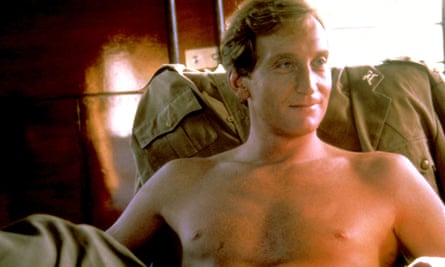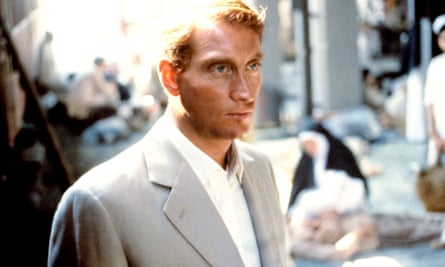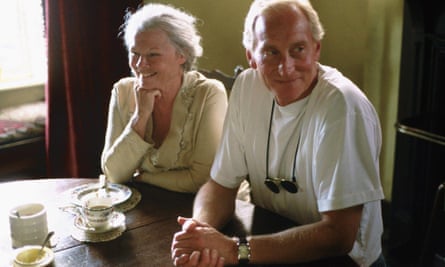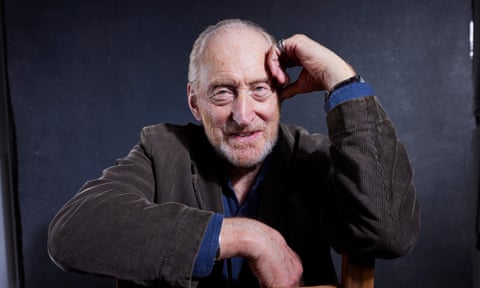I meet Charles Dance in a cute French bistro on Islington Green, north London. He is 76 and has one of those faces that holds its adamantine shape, although its seriousness is offset by his easy, expansive manner, the relaxed confidence and ready laugh of a person who is “doing this fantastic job that I’ve been all over the world with. I get paid pretty well. Something has to be really bad for me to turn it down, otherwise I keep on doing it.”
The restaurant staff love him. The waiter tells me afterwards that he was the second Lannister in that day (Dance played the family’s patriarch in Game of Thrones). Naturally, I ask who the other one was: “I couldn’t possibly tell you.”
Dance is always readier to talk about other people – their thoughts, interests, careers. There was a risk, for a while, that I would come away knowing less about him than about Paul Scott (the author of The Jewel in the Crown, in which Dance starred and broke into the mainstream), or Terry Hands (the director at the Royal Shakespeare Company in its golden years, 1966 to 1991), or Ben Kingsley. But I pulled it back from the brink, reader.
“People think I’m aristocratic because of the way my face is put together, but I’m not,” he says. “My mother was a servant at the age of 13; came from Bethnal Green.” The British class system – what we want it to look like, who is allowed to do what, how this has changed in the past 50 years – is stamped all the way through Dance’s career. While he embodies the ruling class physically, he can also adopt its manners – urbane, lordly, a little bored. Even when he is nothing like the main character in, say, Gosford Park, The Crown or Game of Thrones, he is often what you remember about the atmosphere of the piece.

We are here to talk about the Paramount+ series Rabbit Hole, starring Kiefer Sutherland, which is a bit of a departure for Dance. It’s the first time in a while you will have seen him threatening to cut off anyone’s fingers. He has seen the first two episodes. I tell him the others are great, that I really enjoyed it. “Would you tell me if you didn’t?” Not at the beginning of the interview, no. Maybe at the end.
He looks at me sceptically before conceding that he agrees. “It’s not passive viewing. You can’t slump back with a bowl of crisps and a beer – you have to lean forward.”
Rabbit Hole is a political thriller with a touch of magic realism, a meaty subject – the acquisition of personal data for nefarious political purposes – served with elegant lightness. He has quite an old-school modesty – sure, it’s a good show, Kiefer’s a joy, but then everything’s good now. “With the advent of streaming, the appetite for product is extraordinary. I’m surprised there’s not more crap out there; so much is being made. But it seems to me that the standard of most things now is phenomenal.”
He hares off to say how much he liked the money-laundering drama Ozark, the western Godless, also LBC phone-ins. He is an enthusiast.
Dance was born in Worcestershire, where he went to primary school – “and it was a primary school, not a prep school” – and loved being in school plays. His father died when he was three and a half and he has hardly any memory of him, but his mother was delighted when he became an actor, because his dad “used to do musical recitations. Years later, I was given a medal that he’d got for elocution at some festival in Wales. My mother used to speak very fondly of him – it must have been awful for my poor stepfather, harping on about him all the time.”
His journey to professional acting wasn’t seamless. He went to a technical grammar school. “Very science-based – it was schooling boys to go into the dockyard in Plymouth and work on ships,” he says. “I left there with the sum total of two O-levels – English and art. I knew nothing about Shakespeare.”
As a teenager, he developed a stammer and couldn’t have gone on stage even if his school had entertained such frippery; he couldn’t even talk to girls. “It’s horrible. And I could never be seen to be a stammerer. I’d have to make up the most complicated sentences to get round the words I couldn’t manage. When it came to girlfriend time, it was hell. All the things I wanted to say, I couldn’t say. You could see their eyes glazing over during my terribly long sentences.”
He went to art school in Leicester without much enthusiasm. He ended up working on a building site to pay for acting lessons from two old dudes in Devon called Leonard and Martin, who traded their thoughts on Mark Antony for pints of mild. “The relationship between wise old men and young men who are willing to learn is a wonderful thing. I was very, very lucky that I knew those two.”
His first acting job was touring a play called It’s a Two Foot Six Inches Above the Ground World. “The title alludes to the height of the average person’s genitalia from the ground,” he says, as if this will make sense of things. It was a hard scrabble to get into the RSC, in other words. “I could have sobbed,” he says. “I was overjoyed. I didn’t come from money, I didn’t come from a theatrical family.”

He was there for five years from 1975. Trevor Nunn and Hands were joint artistic directors – “you were either a Terry actor or a Trevor actor”. This was heavily class-coded: Trevor’s were posh and Terry’s were not. Dance was a Terry actor and went everywhere, including Europe and the US. He had married the sculptor Joanna Haythorn in 1970 and they had had a son, Oliver, in 1974 and a daughter, Becky, in 1980. When theatre goes well, he says, “it’s fantastic. You think: I’m right there. I’ve only ever felt like that about three times. And that’s wonderful.” Three times in his whole life? “Yeah … It’s often nearly there!”
The role that made him a household name was Sergeant Guy Perron in The Jewel in the Crown. It’s hard to overstate how much attention there was on this drama in 1984. Set during the last days of the British Raj in India, it was lavish, epic and launched a number of careers (including those of Art Malik, Tim Pigott-Smith and Geraldine James). There just wasn’t that much TV back then. “My agent said: ‘You can’t possibly do that, it’s too grand for you.’ I think I had to read almost every scene to convince them. And thank God I did. But I didn’t appear until the last four hours and I thought: if this is a turkey, people will have switched off before they get to me.”

As well as introducing Dance to non-theatregoers, the role transformed him into the quintessential British hero, although he denies that such a transformation took place. “I’ve never felt I arrived as a leading man. I’ve never fronted anything. No, wait, there was a series called First Born; I suppose I was the leading man in that.” (He played a scientist who creates a human-gorilla hybrid.)
“The problem is, I just like working, so I’m perhaps not as choosy as I could have been,” he says. Well, up to a point – but didn’t he turn down the chance to play James Bond? (This was in the mid-80s, after Roger Moore had stepped down.) “No, of course I didn’t turn down James Bond! What happened was, my agent called and said: ‘I urge you not to do it. Just think how you’ll feel if you don’t get it. It will kill your career stone-dead.’ She was probably right. If I’d got it, I would have probably fucked it up.” So, OK, he didn’t turn down Bond, he just didn’t audition. He doesn’t turn down work unless it’s absolute garbage, he says.
Dance was a staple by the late 80s. Some years, such as 1987, there are three films you remember and Dance was in all of them (White Mischief, Good Morning Babylon, Hidden City). He prefers filming to theatre: “I like that community – it’s like the circus coming to town. Everybody gets to know each other very, very quickly – it’s just a great feeling. The smell of a film set … we used to talk about the smell of the greasepaint, but the smell of a film set – there’s nothing like it.”
He made a foray into writing and directing with 2004’s Ladies in Lavender, starring Judi Dench and Maggie Smith. It was an unusual film and much talked-about, partly because it was quite a bold proposition, a film full of old ladies. “That was one of the few films that gave the UK film council a return on its investment, though I say it myself,” he says. “It was charming. It didn’t move mountains, cinematically – it was just a sweet little film about two old ladies living in Cornwall. Fortunately, I had Judi Dench and Maggie Smith. I could have shot the telephone directory.”

By the time Game of Thrones came along in 2011, a new demographic that had never heard of The Jewel in the Crown was ready to be introduced to Dance. “I had no idea where it was going to go,” he says. “None of us had any idea that it was going to be the most successful television series ever made. Especially as the pilot wasn’t great. If it had been made by the BBC, they would have pulled the plug. But Sky and HBO nursed it and we began to be aware that we were dealing with a pretty class act. I still had no idea that it would become this charming monster.”
Divorced since 2004, by this time he was in a relationship with the artist Eleanor Boorman. They had a daughter, Rose, in 2012 and separated the same year. “I don’t see much of Rose, unfortunately, but that’s just the way it is,” he says. Dance has been with the film producer Alessandra Masi since they met on the set of The Book of Vision in 2018; on the day we meet, she is shooting in Italy. She is a really great producer, he says – she has a bike and goes everywhere on it. Even given his tendency to extol people’s virtues, it is sweet how many random things he finds delightful about his girlfriend.
Is he ever going to work less? He has done six or seven jobs, he says, in the past two years. It’s a schedule not dissimilar to his heyday after The Jewel in the Crown. The man who has been counting his blessings since long before gratitude journalling was invented waves this off. “I’m lucky enough to do a job that I love,” he says. “There are many, many people who do jobs to put food on the table and pay the bills. And there is always a bit of me that feels guilty when I turn down work. I think: who am I to say no?”
This article was amended on 27 March 2023 because the TV adaptation of The Jewel in the Crown was in 1984, not 1981 as an earlier version said.
Rabbit Hole is available to stream on Paramount+
